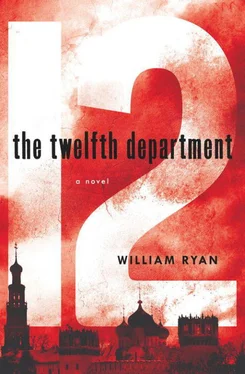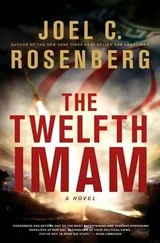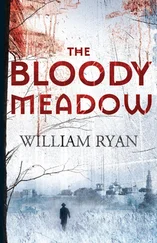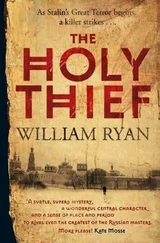“It’s the big hotel, on the left. You should see inside it—they’ve a pool with beautiful girls swimming in it, a bar with white-jacketed waiters, and a band that plays music all day long. And past it, on the other side of the square, is the Hotel Moskva. They say it’s even grander still.”
“A pool full of beautiful girls?” Yuri wrinkled his nose in amused disbelief.
“I didn’t believe it either but I’ve seen it with my own eyes,” Korolev said, and ruffled the boy’s hair. “Anyway, you’re too young for that sort of thing.”
“Better than being too old,” Yuri responded and Korolev felt obliged to give his ear a gentle clip.
* * *
They carried on like that all the way to Kievsky Station—sparring. They were getting to know each other. There had been awkward moments the day before—when Yuri had treated him almost as if he were a stranger—but they’d got past them and Korolev was relieved. After all, if something happened to Zhenia, Yuri would have to come to Moscow—and if they were to live together, they’d better find a way of getting on. And that thought, mixed with his nagging concern for Zhenia, stayed with him throughout the train journey.
It took forty minutes or so to get out to Peredelkino and Korolev was surprised, as always, by how soon Moscow turned into countryside and the contrast between Peredelkino and the bustle and hustle they’d left behind. When they descended from the train, they took their time as they walked slowly along the platform toward the waiting ticket collector, looking around at the forest that surrounded them.
“Is it far,” Yuri asked, “this dacha?”
“Not too far.”
The station building was tiny, a white cube with a tiled roof, painted green. Each carriage of the departing train was reflected in its single window as it pulled away. The ticket collector, a young woman who didn’t look much older than Yuri, sat on a stool beside the arched entrance. When the last of the train disappeared, it left silence behind it.
At first Korolev thought they’d been the only passengers to descend but, as he reached for their tickets, he caught a glimpse in his peripheral vision of two men strolling behind them. He hadn’t heard any other doors opening and shutting when they’d got off the train but then he hadn’t been listening. There was something about these men though—something in the way they held themselves—that drew Korolev’s attention now. He made a show of emptying his pockets for the train tickets and used the opportunity to allow his gaze to wander back toward the strollers.
The two men were young—late twenties would be his guess. The taller of the two had tousled brown hair, a dark complexion, and a fighter’s fist-flattened face—he looked like he could handle himself. The other was softer looking, with a round chin and a physique to match, but when he saw Korolev looking he didn’t avoid his gaze. Instead he seemed amused by it.
Korolev turned to hand the tickets to the collector, and made the effort to smile, even though, if the truth were told, he was unsettled by the two men behind them.
“Will we go swimming straightaway?” Yuri asked. Korolev took back the clipped tickets and pushed him forward gently.
“As soon as we’ve unpacked. Not a moment later.”
“Good, after we’ve unpacked then.” Yuri looked up at him and Korolev nodded to confirm his agreement. He was jumping at shadows—he had to be. The men couldn’t be who he thought they might be. After all, why follow him? If State Security wanted to know what he was up to they could just demand he tell them. And if they were worried about what he might do—well they could stop him doing anything ever again whenever they chose. And if the men were from State Security, they’d been surprisingly visible—almost as if they’d wanted to be seen. Why on earth would they want that? That wasn’t the way they did things.
Korolev risked another look back as they neared the old monastery, where the road turned to the left—but the men had gone. Probably they’d just been ordinary citizens after all, coming back from a night with friends in Moscow, likely as not. That was it. That might make sense.
He wasn’t so reassured, however, that he didn’t keep looking behind them from time to time—just in case.
* * *
Babel’s dacha was a fifteen minutes’ walk from the station—a fine house: a red-painted corrugated-iron roof topping the white-planked walls, and a solid concrete base for it all to stand on. It was only a couple of years old and sat in a small clearing in the forest. Behind the house was a garage that Babel had no car for, and a small cottage for Lipski, the caretaker, an old comrade of Babel’s from the writer’s years with the Red Cavalry. Korolev could think of worse places to spend a few days with his son, and he told himself to put all his irrational concerns aside. All was well, he was sure of it.
Korolev stopped on the driveway and squeezed his son’s shoulder, determined to send his worries packing.
“Hear that?” he asked.
“What?” Yuri asked, looking around him.
“The wind in the trees, Yuri. If we were in Moscow now, think of the hundred different noises there might be now—cars, trams, people, building work. Here it’s only the wind in the trees.”
Yuri looked up at him and then at the house.
“Your friend lives here ?”
“He’s away in the south. He told me to use it while he was away.”
“He has a whole house to live in—on his own?”
“No—he lives upstairs from us in Moscow. This is just his summer house. I told you about him—Babel. The writer.”
“His summer house?” Yuri seemed to consider such luxury a mathematical problem. “And he has an apartment as well?”
Korolev resisted the temptation to explain to the boy how some people were more equal than others in this socialist society of theirs.
“Come on, let’s go inside.”
Korolev directed the boy toward the side of the dacha where steps led up to a covered porch that ran around two sides of the house. The hollow sound of their footsteps brought a twinkle-eyed old man to the doorway—Lipski. When Babel had been allocated the house, he’d managed to wangle a job for the old Cossack.
“Korolev? I wasn’t expecting you till later. So this is the boy? Let me look at him.”
Lipski leaned forward so as to be able to examine Yuri on an equal level, his rosy cheeks seeming to glow with pleasure above his thick white beard.
“So you’re the famous Yuri Korolev?” he said.
Yuri considered the question for a moment before nodding his agreement.
“A Pioneer as well, are you?” Lipski reached out to touch the red scarf tied around the boy’s neck. Yuri took a step backward to avoid the caretaker’s hand, but Lipski’s smile didn’t dim.
“I never heard of a shy Pioneer. Did you, Korolev?”
“I’m not shy,” Yuri said, looking at the caretaker’s boots.
“That’s good to hear. Do you swim at all?”
“I swim.”
“Well, you’ve come to the right place. That’s the best riverbank this side of Moscow, not a hundred meters away. What do you make of that?”
Yuri said nothing.
“We’re going for a swim later on,” Korolev said—deciding some kind of intervention was necessary, unsure why Yuri had decided to clam up all of a sudden.
“Good, good,” Lipski said, pushing himself up to his full height, no longer smiling so much as grimacing. He was still fit, the old cavalryman, Korolev could see, but age caught up with everyone’s bones in the end.
“I’ve made up the beds for you and aired the place. If there’s anything else you need, you know where to find me.” Lipski glanced down at Yuri with a thoughtful expression. “I can pick up food from the shop for you if you need it—I’m going that way.”
Читать дальше












